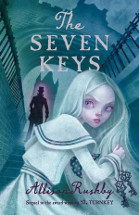The seven keys by Allison Rushby

Walker, 2019. ISBN: 9781760650797.
(Age: 10+) Highly recommended. Themes: Cemeteries, Magnificent
Seven, London, Victorian age, Death, Supernatural, Foundling
Hospital. Standing at the gates of Kensal Green Cemetery, Flossie
knows that something is wrong. The Turnkey, Hugo Howsham, worked
with her to prevent a Nazi takeover of Great Britain seven years
before, the two combining the power of their keys to destroy the
skull that allowed the dead to communicate with the living. Hugo had
made her promise to keep this secret and Flossie had not told any of
the other Turnkeys about the power contained within their keys when
they are united. But when he steals Flossie's second key she knows
that he is amassing the keys to gain power over the Magnificent
Seven, the seven cemeteries within Greater London. But to what end?
She tries to elicit the help of the Turnkeys of the other
cemeteries, but they are so disappointed with her that they repel
her, forcing her to work on the problem herself. Surprisingly Hugo
allows her to summon Daisy, her former maid and the two investigate,
all the while keeping watch on Hugo.
A glittering sequel to The
Turnkey (2017), the ghostly Flossie is an admirable character,
keeping watch over the interred in her cemetery, Highgate. It is her
job to keep everyone at rest, but when the interred in several
cemeteries seem disturbed, she must act.
She is dismayed when she sees Hugo march the interred to Kensal
Green and even more upset when she realises that his possession of
three keys makes him almost visible to the living.
She and Daisy go to his former house and there search his archives
to find the reason for his removing the interred from their place of
rest. As an architect he proposed the building of an enormous
pyramid to house all the dead, rather than waste space in the city
of London on the seven cemeteries. Flossie realises that he is
putting this plan into operation using the dead as his slaves.
Wonderfully evocative of nineteenth century London and its seven
cemeteries, the storyline is captivating, the main character,
Flossie an engaging young girl, working hard to ensure her interred
remain happily at rest.
Daisy, a new character in this book is from the Foundling Hospital,
a London charity begun in the late eighteenth century, which takes
in children. Now open to visitors, it is a salutary reminder of the
numbers of vulnerable children with nowhere to go in the times
described so well in this novel. Add it to your list of places to
visit when next in London.
This fine historical novel, is an engaging and spirited sequel which
will leave readers wanting more.
Fran Knight